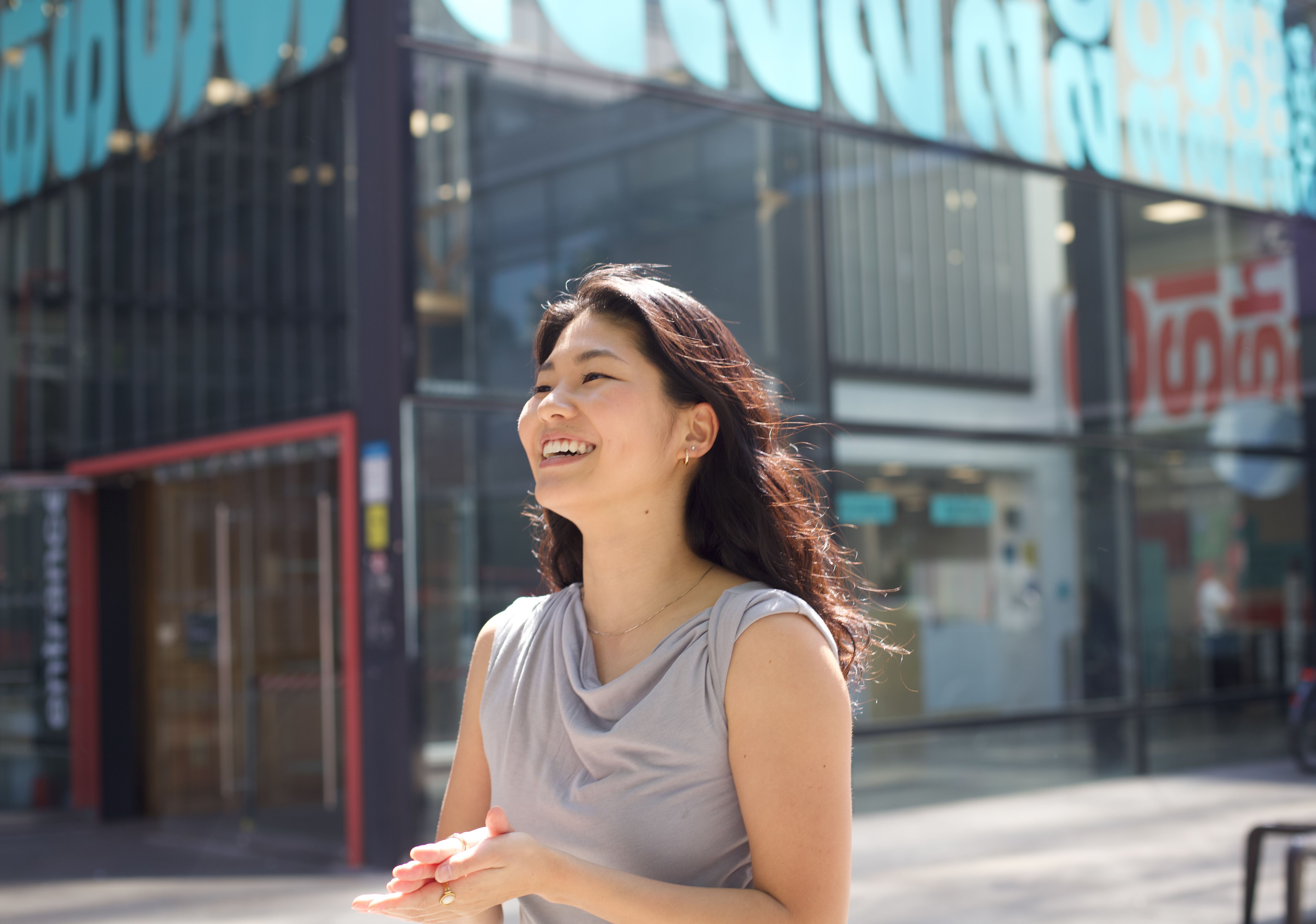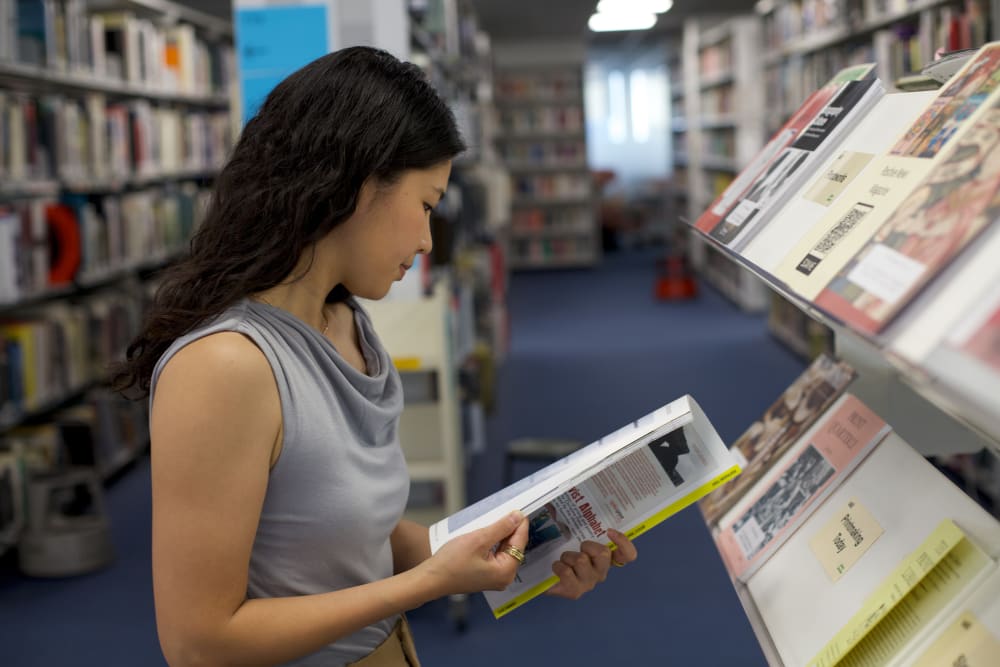
Meet MA Design Management student Maho Irie

- Written byJoshua Flynn-Hutt
- Published date 26 July 2024

We recently spoke with London College of Communication MA Design Management student, Maho Irie.
Maho told us of her journey from Tokyo, to studying in Toronto, before coming to London undertake her MA in Design Management. Maho spoke on the highlights of the course and her experience of living in London so far.
Hello Maho! Please give us an intro to yourself and why you chose to study MA Design Management?
I was born and raised outside of Tokyo Metropolitan in a city called Kawasaki, Japan. There, I initially pursued my dream of becoming a professional dancer to go on a global tour. I soon realised that, in order to do that, I needed to get out to experience more of this world. When I was 16, I moved to Canada to challenge myself by attending a local high school and after that, I pursued BA in Creative Industries in Toronto. Throughout this journey, I discovered my interest in the inner workings of the entertainment business. I interned at a music label and started my first job working for a dance studio, where I realised, I couldn't just stick to business – I needed a little bit of creativity in what I do as well. This realisation led me to make a change and move to London to start my master’s degree in Design Management at London College of Communication.
What motivated you to pursue your studies at UAL, and how does the creative environment here differ from what you experienced in Japan and Canada?
Growing up I always loved to perform. Like I mentioned earlier, my dream since the age of 5 was to become a professional dancer. However, I quickly realised that it wasn't that easy.I thought I’d need to gain more knowledge about what the industry is about, so I immersed myself in the world of performing arts. As I attended numerous live performances, I realised that as important as they are the performers are just one part of the production and there are many other people working behind the scenes to make it happen. This understanding led me to discover that there are many roles in demand beyond just performing to be involved in this world.
My BA in Creative Industries was broad as it could be, but I also discovered a demand for someone who can be the connecting point for artists and opportunities. I progressed towards a more business-focused job after university. However, I quickly realised I needed to find a balance in creative and logical sides. Although I didn’t know exactly where I would fit in, I knew there was a place for me.
When I was searching for a change, I came across this course at UAL. The name Design Management stuck with me. Since starting the program, I’ve come to understand it is a perfect fit for my agility between my artistic and logical brain.
The course has allowed me to redefine my understanding of ‘design’. I always had this dilemma that I wasn’t creative enough to be in the creative industries, and that I wasn’t suited to pursue a career in design. But design can be anything. Of course, it can be art and paintings, but a city is a design, government policy is a design, the app we use every day are designed for us and even the mug I’m drinking coffee from right now has been carefully designed. This redefinition of design for me, which I never gained back home or through my studies in Canada, was very comforting and broaden my perspectives.

Could you share an example of how your background has influenced your creative process or perspective through your studies?
The concept of positionality is something that I’ve been constantly aware of in my creative process since learning about it in my program. The way we think and work is heavily influenced by where we come from and how we were raised.
When I hear that we can choose our topic for our final major project, I immediately knew I wanted to make it about my home country. I identified that there is a gap in communications for foreigners around earthquake countermeasures. I decided to make this the focus of my project.
In this project, my positionality makes it for a stronger argument since it is a personal pursuit of mine. As someone who has grown up in Japan and experienced earthquakes firsthand and being a bilingual individual, I have a unique perspective on the issue and a deep understanding of the challenges faced by both locals and foreigners. This personal connection to the topic has not only motivated me to tackle this project but has also provided me with valuable insights that I can incorporate into my creative process. I believe my positionality allows me to approach the problem with empathy, cultural awareness, and a sense of responsibility to make a positive impact on my home country.
My submission proposal for the project outlines the current state of earthquake preparedness communication in Japan, identifies the challenges faced by foreigners in accessing and understanding this information, and proposes design solutions to bridge the communication gap. As I delve deeper into my research, I will analyse existing earthquake preparedness materials, gather insights from interviews with foreigners living in Japan, and develop practical design solutions to address the issues identified.
Understanding the value of my positionality has given me the confidence to embrace my unique perspective and use it as a driving force in my creative process. It has encouraged me to tackle projects that resonate with me on a personal level and to create solutions that not only address real-world problems but also reflect my own experiences and insights which I can offer to the world.
You mentioned that you are working on a project with UNESCO to develop communication strategies to reshape perceptions towards oceans and prevent further climate change effects on ocean health. How did this opportunity come about?
One of our units was called the Collaborative Unit, where we had the opportunity to collaborate with classmates and the school-wide network to work on real-life project briefs. Our program was presented with multiple opportunities, and one of them was to work with UNESCO on UN Ocean Decade Challenge 10.
Fortunately, our team's hard work and dedication paid off, as our project was shortlisted by UNESCO. This recognition was a testament to the quality of our work and the potential impact it could have on raising awareness about ocean health and climate change. You can find out more about our project by visiting the UAL Showcase website.
I feel incredibly grateful to have been a part of this talented and passionate team, and I am proud of what we were able to achieve together. The opportunity to work on a project with an organisation as prestigious as UNESCO and to receive recognition for our efforts has been a highlight of my time at UAL.
Can you share a project or experience where you felt encouraged to take risks and explore new ideas?
Throughout my studies at UAL, I have consistently been encouraged to push boundaries and step out of my comfort zone in all of my assignments. As someone who considers myself a very logical person, this has been a challenging but rewarding experience.
One recent unit that particularly stands out is called Global Design Futures. In this unit, we engaged in various exercises that required us to speculate on our futures and explore new ideas. The process itself was challenging for me, as it pushed me to think beyond my usual logical and structured approach to problem-solving.

Since beginning your studies, has there been any opportunities through UAL that have helped you to meet likeminded students and explore new areas of creative practice?
One notable opportunity that UAL provided was a visit to the Design Museum in April, which was organized as part of one of our courses. We had multiple museum trips throughout the program but what made this one particularly special was that we were joined by master's students from HKU University of the Arts Utrecht in the Netherlands.
During the visit, we had the chance to interact with these students and engage in meaningful conversations about our respective programs and research topics. It was fascinating to discover that, despite coming from different backgrounds and studying in different countries, we shared many common interests and passions within the creative field.
Before coming to UAL, did you access any support to help you understand the application and visa processes, and what to expect for life in London?
I received visa support from UAL country reps for Japan BEO. In addition to assisting with the visa application, they organised an event during the summer before I came to London to connect with fellow Japanese students who were planning to attend UAL at the same time as me. This event provided me with a valuable opportunity to make connections with students in other programs, which I might not have had the chance to do otherwise. It was a very pleasant and helpful experience.
Thinking of your post-university life, how have your studies and experiences in London helped to develop your goals and future career pathway?
My experience in the Design Management program has been a journey of self-discovery. It has helped me gain a deeper understanding of my strengths, passions, and the unique value I can bring to the creative industry.
Looking back, it's interesting to see how my childhood ambition of becoming an international dancer has led me to where I am today. Throughout the years, I have learned to accept that life doesn't always go according to plan, and this realisation applies to everything that shapes my future, including my career development.
Academically, studying in London and being part of MA Design Management has broadened my perspective on what a career in the creative industry can entail. It has also helped me identify where I can make a meaningful impact. The program has taught me to think in many different ways which I believe will be essential in my future career.
Outside of academic, simply living in London has taught me the importance of adaptability and resilience. Although I have lived outside of my home country for a while now, living in a new city still poses challenges that encourage me to step out of my comfort zone and embrace change.
As I look ahead to my post-university life, I am excited to apply the knowledge and skills I have gained through my studies and experiences in London. While my specific career path may not be exactly as I had envisioned when I was a little girl, I am confident that the self-discovery and personal growth I have undergone during my time at UAL will serve as a strong foundation for a fulfilling and successful career in the future.
If, like Maho, you wish to continue your studies, head to our postgraduate study page to explore the courses we offer.
You'll also become part of our UAL Post-Grad Community. Our platform for all UAL master's level students to share their work and connect with other creatives within the university and beyond.
International students can access support from our official in-country representatives. Find the contact details of your local representative on our countries page.